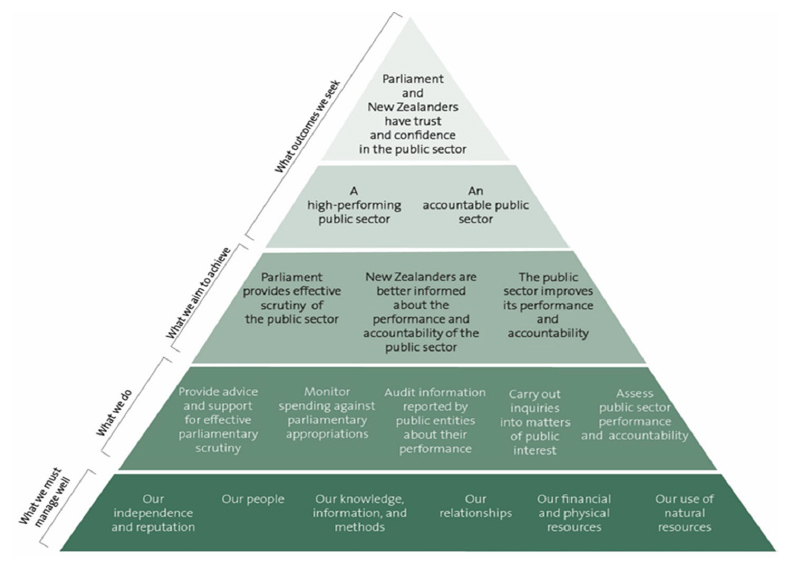Part 2: Our strategic context
Our strategic direction
The Auditor-General’s strategic intentions to 2025 is our long-term strategic planning document. It sets out the enduring outcomes and impacts we seek from our work and provides the strategic context for our annual work programme. The figure below sets out our performance framework, and the ultimate outcome that we seek from our work is shown at the top of that framework. We want Parliament and New Zealanders to have trust and confidence in the public sector. To achieve this, the public sector has to perform well and be accountable.
Our performance framework

As the auditor of every public entity, we have a role with each organisation – and we can also see the overall performance and accountability of the entire public sector. This gives us a unique position from which to influence a high-performing and accountable public sector that has the trust and confidence of Parliament and New Zealanders.
The Auditor-General’s Strategy 2018-21 is our medium-term strategic planning document. It describes how we intend to influence the impacts and outcomes we seek by focusing on work that will help to achieve more impact from what we do. We regularly review our progress against our strategy in the context of our changing operating environment. This enables us to keep our work focused on where we can make the most difference in influencing our outcomes.
Our strategy is organised around four strategic shifts.
Strategic shift 1: Focus more on examining how well the public sector achieves positive change for New Zealanders
The spending of public money is meant to achieve good outcomes for New Zealanders – providing support and services that make a positive difference to our lives.
A strong feature of our work programme for 2020/21 is a focus on topics that examine how well the public sector is delivering outcomes in areas that are fundamental to the quality of life for New Zealanders. In 2019/20, we started a programme of work to look at how the public sector is achieving reductions in family violence. We will continue this work in 2020/21, and we will also start to explore whether outcomes have been achieved in a range of other areas, including housing and education.
Strategic shift 2: Help New Zealanders become better informed about public sector performance and accountability
We have an important role to play in the public’s trust and confidence in the public sector. To achieve trust and confidence, New Zealanders need to be informed about the issues that matter to them in ways that are meaningful.
The regular reporting that we do is how we keep New Zealanders informed about the performance of the public sector, and we continue to work to encourage improvements in reporting by public organisations.
This year, we intend to begin work looking specifically at how the public sector is accountable to communities. Part of this will include seeking views from specific communities about what is important to them about the services they receive. We also want to expand the information that we provide about public sector performance and explore ways we can make it relevant to individual communities.
Strategic shift 3: Be more active in sharing insights about what “good” looks like
We are in a unique position to identify and share examples of good practice to support entities to improve. We also have an important and influential role as an information broker, connecting organisations to share experiences about what works.
We have recently started updating our suite of existing good practice guides. We will continue this in 2020/21. We are also looking at other ways we can encourage and promote good practice, including running more forums where members of the public sector can share experiences, make connections, and access resources to help them implement improvements in their own organisations.
We see independent audit and risk committees as a vital partner in supporting public organisations in this way. In 2019/20, we launched an Audit and Risk Committee Chairs’ forum for chairpersons in Christchurch and Auckland (as well as the ongoing Wellington forum), and we encouraged local authorities to appoint independent chairpersons for their audit and risk committees.
In 2020/21, we want to strengthen these relationships to better understand the challenges public organisations are facing. We will also provide targeted information to provide the right support at the right time.
Strategic shift 4: Help improve the public sector accountability system
In a more diverse and connected world, the public demands more from our public accountability system. An effective accountability system is critical to New Zealanders’ trust and confidence in the public sector and in government. We have an important role in influencing the shape of the public accountability system to meet the expectations of New Zealanders today and in the future.
In 2019/20, we worked closely with the Treasury, the State Services Commission, and others to influence thinking about changes to the public accountability system. We made submissions on public sector reforms and published these on our website. We carried out research into the state of the public accountability system as a whole and intend to publish our thoughts on particular aspects of the system, such as the quality of performance reporting throughout the public sector.
During the coming year, we want to look more closely at how public organisations are starting to implement the well-being agenda that the Government has promoted (as well as the United Nations Sustainable Development Goals that the Government has signed up to). We also want to look at how the accountability system is working for Māori, as well as in communities generally.

